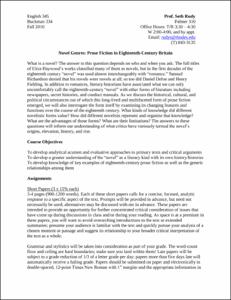Please use this identifier to cite or link to this item:
http://hdl.handle.net/10267/15462| Title: | ENGL 345-01, Novel Genres: Prose Fiction in Eighteenth Century Britain, Fall 2010 |
| Authors: | Rudy, Seth |
| Keywords: | English, Department of;Syllabus;Curriculum;Academic departments;Text;2010 Fall |
| Issue Date: | 25-Aug-2010 |
| Publisher: | Memphis, Tenn. : Rhodes College |
| Series/Report no.: | Syllabi CRN;11465 |
| Abstract: | What is a novel? The answer to this question depends on who and when you ask. The full titles of Eliza Haywood’s works classified many of them as novels, but in the first decades of the eighteenth century “novel” was used almost interchangeably with “romance.” Samuel Richardson denied that his novels were novels at all; so too did Daniel Defoe and Henry Fielding. In addition to romances, literary historians have associated what we can only uncomfortably call the eighteenth-century “novel” with other forms of literature including newspapers, secret histories, and conduct manuals. As we discuss the historical, cultural, and political circumstances out of which this long-lived and multifaceted form of prose fiction emerged, we will also interrogate the form itself by examining its changing features and functions over the course of the eighteenth century. What kinds of knowledge did different novelistic forms value? How did different novelists represent and organize that knowledge? What are the advantages of those forms? What are their limitations? The answers to these questions will inform our understanding of what critics have variously termed the novel’s origins, elevation, history, and rise. |
| Description: | This syllabus was submitted to the Office of Academic Affairs by the course instructor. Uploaded by Archives RSA Josephine Hill. |
| URI: | http://hdl.handle.net/10267/15462 |
| Appears in Collections: | Course Syllabi |
Files in This Item:
| File | Description | Size | Format | |
|---|---|---|---|---|
| 2010_FALL_ENGL_345_01_11465.pdf | 101.3 kB | Adobe PDF |  View/Open |
Items in DSpace are protected by copyright, with all rights reserved, unless otherwise indicated.